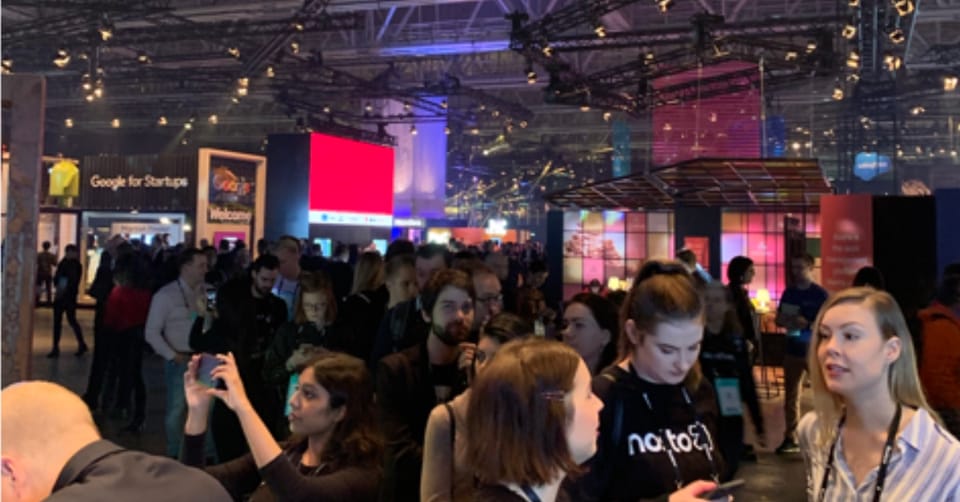Et tu, booth?

If the move to virtual events over the last year has done anything, it has laid bare the fact that sponsored conference booths, both physical and virtual, are a waste for everyone involved. Don’t get me wrong, for in-person events, I actually enjoy staffing a booth. But I think the return on investment, particularly when you’re serving a developer community just isn’t there to justify the cost. Maybe, just maybe, it’s time to start thinking about how we can better spend that money.
So let’s talk about the real stakeholders when it comes to booths and how they’re involved in this mini-economy of sponsorship packages:
The sponsors
For the sponsors, a booth is an opportunity to aggressively market their wares to attendees, like the conference equivalent of a silk route bazaar, usually generating leads for sales teams to build on. The traditional measure of these leads is “badge scanning”, where sponsors are issued with scanners that are then used to read your conference badge, giving them access to the details you provided to the organiser when you registered. Badge scanning is a really easy way to measure the return on your sponsorship dollars, but it’s not a particularly targeted way to interact with your community, and in a GDPR world, god only knows if it’s being done in a legally sound way.
That’s not to say that some companies don’t do booths well, but they’re the outliers from what I’ve seen at events.

And there’s such variance in the booth experience. You have tiny startups sinking a relatively large percentage of their budget just to get a postage stamp of pre-built space, all the way to large scale companies who will (sometimes literally) build a bespoke small village of booths.
But for the most part, regardless of the size, a company will sponsor a booth to do one thing - get your contact details to sell you something now or in the future.
The organisers
For organisers, booths are basically a way to pay the bills, which we’ll give them the benefit of the doubt and say they’re using that income to lower the cost of entry, enabling a more diverse set of attendees, and that’s reasonable. Some percentage though are just using it to maximise profits. But I seriously doubt any conference organiser proactively wants booths. They’re a means to an end, a way to pay for all the stuff they actually want at the event.
I think the only exception here is when the booth is run by the organiser. If you’re going to the likes of F8, WWDC or Dreamforce, then having booths run by the various different product teams makes sense, because really the whole event is a marketing effort, and the reason you’re attending is probably exactly to meet with the people at that company. Outside of that specific use case though, I think the above holds true.
The attendees
That just leaves us with the final stakeholder, the attendees. These are people who the event is supposedly for, but as in this article, are usually the last folks on the list when thinking about the value of the booth. Have you ever met who bought a ticket to an event thinking - “I cannot wait to have an opportunity to share my contact details with companies who want to sell me things”? I certainly haven’t. Networking, sure, but signing up to be called by a Sales Development Rep? If you believe they do, can I scan your badge, cause I’ve got a bridge to sell you.
For attendees, the “expo area” - which is a fancy name for the booth village sponsors have built, is a place to go to kill time. It’s nearly impossible for organisers to put together a schedule of content where you’ll be engaged the whole time, so there are points in your day when you’ll have some free time. During that free time, most people will grab a coffee and head to the booth area to wander around.
And this is where we get back to virtual events and the role they’ve played in bringing down the booth ecosystem. If you’re sitting at your desk, or your couch, or wherever you’re working from that day, when you have downtime in between the content (usually the primary reason someone attends an event), would you rather go to a “virtual booth”, or would you, I dunno, do something productive like make some food or catch up on work.
The environmental impact of all this
And none of this even takes into account the environmental costs of booths. There’s the impact of flying in the staff, the materials used to build the booth, the materials to produce the leaflets, the swag, the shipping of all that to the venue, the time it takes to produce all those things and more. And for a lot of organisations, these materials are considered single-use, even the very booth itself.
On the Developer Relations team at Slack, before the pandemic put a halt to in-person events, we made the decision to cut down on per-event custom booths, focusing instead of something we could re-use. We also decided that when we gave out swag, we could give items that were extremely low impact, or at least somewhat useful. Nobody needs another company branded 50c pen in their life.
With in-person events starting to be planned, I think we’ll definitely see some large budget events, especially the self-organised types like Dreamforce or Google I/O, but society continues to quite rightly frown upon organisations who ignore their environmental responsibilities, so I don’t see my team’s approach changing here. If anything I suspect we’ll be more aggressive.
Be an authentic community member
If you’re trying to be authentically part of a community, you need to ask yourself what value are you bringing by having a booth at an event?
Maybe you’re doing it to give your community an opportunity to come ask you questions, and certainly once COVID restrictions begin to ease and it’s safe to do so, there is value in having real life face to face time with your community, but if spending money on a conference ticket in the hope that the right person is staffing a booth is the only way your community can reach you, then you might have much bigger problems with your outreach strategy.
If you really want to help the community, maybe the better approach is to work with a local community organiser to use what you would have spent on booths to fund their regular meet-up, the one that will continue long after the conference venue has been converted to whatever the next show in town is.
